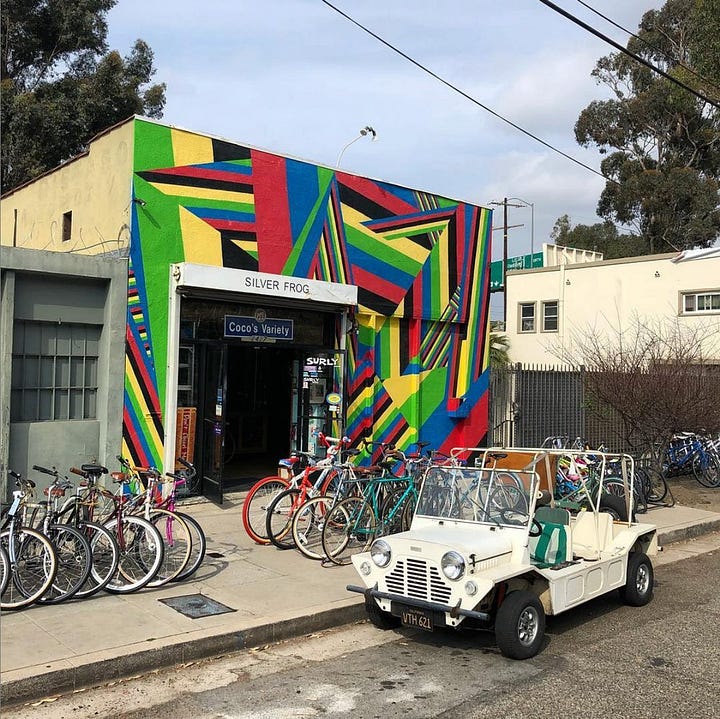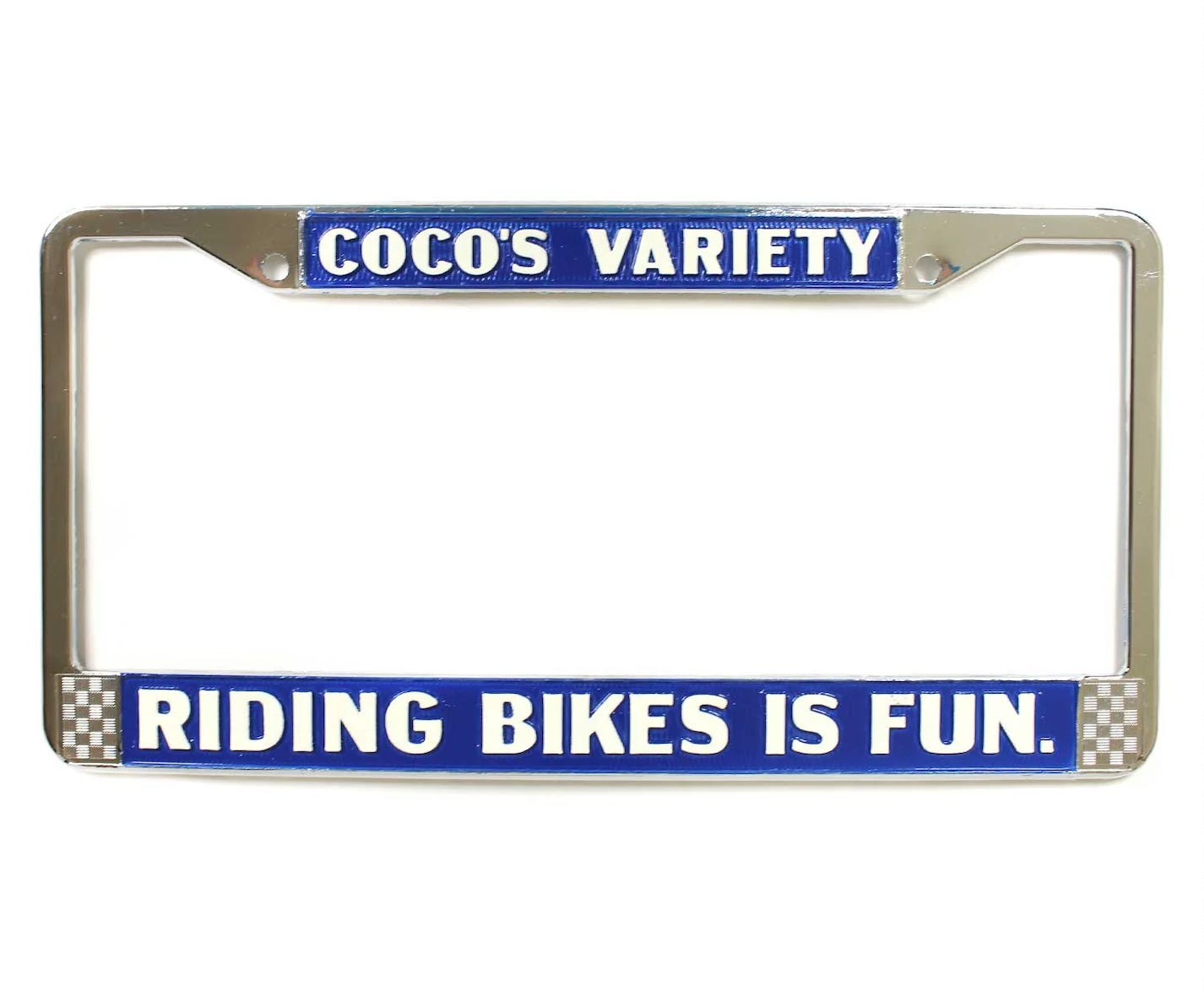

We’ve spent about a year working on Take Me to Your River and this accompanying Substack. As we continue studying these neighborhoods along the LA River (Elysian Valley, Atwater Village, Glassell Park and Cypress Park) and collecting stories from community members, meaningful patterns are starting to emerge.
Each of these four neighborhoods is home to legacy businesses and institutions like Vince’s Market in Atwater Village or Pepe’s Tires in Cypress Park — places that persist thanks to those who hold onto history and stay connected to others doing the same. Longtime regulars and newcomers alike help shape the longevity of these neighborhood fixtures, alongside distinct personalities who observe and stay attuned to neighborhood rhythms and trends.
Environment shapes experience. We’ve had the opportunity to meet countless people who hold deep memories and attachments to their communities. For many, these neighborhoods are an inextricable aspect of who they are — an extension of their being. Individuals who are otherwise strangers to one another share key life experiences because of the trajectories of their overlapping proximities and connection to shared place.
Our interview below with Peter Vermeren of Coco’s Bike Shop on Riverside Drive represents a perspective of a newer business that couldn’t quite make it all the way through the challenging times of the pandemic. As Peter mentions, we sometimes understand our trauma or experiences as being unique, but tragedy exists everywhere, albeit one or two degrees removed, connecting us all and inspiring collective resilience. Peter has persisted and shares his insights about how to run a small business in a neighborhood that has transitioned, and how he views and treats his neighbors.
Interview with Peter Vermeren of Coco’s Variety
Julia and Peter have been friends and neighbors for close to 20 years, both riding the wave of Frogtown’s gentrification. When you are in conversation with Peter or reading Coco’s newsletter, he both gushes and rages about being a small business owner in late-stage capitalism. Peter is straightforward and direct about his love of bikes, found treasures, and wanting peace and prosperity for his neighbors. He often cries when talking about the beauty and cruelty of the world; it’s what I love about Peter. He is a one-of-a-kind person, and it’s been an honor to share space with him in Frogtown over the past decades.
Julia: We are here with Peter Vermeren at Coco’s—or what formerly was Coco’s, should I say?
Peter: Well, it started as a filtered water store. Do you remember that?
Julia: Yes, I do. Back in 2007 or 8?
Peter: I also own a coin laundry in the Valley; within this business we had a little store that always had good business. We would sell over-the-counter medicine, filtered water, phone cards—when phone cards were a thing. It always did pretty well.
At the beginning, I wanted to buy this building in Frogtown, and I hoped that a store like that would cover the mortgage of the building. The idea was that it would become a bigger thing and it would become a chain, like a small Latin Walgreens, but it would be more personal and more recommendation-based, and you would know the person behind the counter. It was called ‘Coco’s Familia Saludable.’
I owned the laundry in Burbank for about 10 years, and the laundry still has that little store. It still does well, and the laundry is like the City Hall of the neighborhood. My manager works there and she is super embedded in the community; she knows all the gossip, she knows what's going on, she knows how to solve every problem. I hoped to do that here, but it didn’t happen because the neighborhood changed, and there’s no parking. Who wants to carry water bottles to the end of the block where your car is parked?
So it didn’t really work. So I bought a used bike at a garage sale and parked it out front, and it sold in like fifteen minutes. So we just started doing that. I think there is an interesting nobility if you can make it happen, if you just open the doors and see what the community needs. Turns out the community needed a bike store. That was good for us for a long time, but then it just got too hard.

Julia: Do you think small business is still like that? Can you survive with that kind of ethos and mission, to provide for the community?
Peter: Absolutely — that perspective makes any small business stronger. But small business is hard in general. The bicycle business, specifically, is complicated in that there are four big bike companies and they control about 85% of the business. And those four big companies — if you get into their sphere — own all the necessary goods, and they give you a lot of discounts if you buy everything from them, but they also want to tell you how to run your business, they want to remodel your store, they wanted to make it look like a T-Mobile store, and I’m like, that’s not going to work, it’s not who our customers are.
Julia: I have some sense of the rollercoaster that you went through in the pandemic. Can you synopsize that for us?
Peter: It still makes me really emotional; it’s just really hard. We stayed open the whole time, and the laundry was open the whole time. We didn’t know if we were going to die, and the responsibility was on me. When the mandates came down on what qualified as essential business, auto repair shops were essential and bicycle repair shops weren’t.
If you’re homeless, the bike is how you get food, how you access services, how you get around. It might not sound like work, but it is. The mandate was written by people who have money and don’t understand not having money.
There were people saying, ‘I’m just working from home,’ and we’re thinking, ‘We’re working, and everyone is dying around us.’ It was a new divide in society between people who had to work and those who didn’t, those who outsourced their risk to somebody else. At its peak, the laundry was losing $10,000 a month, and for months and months we lost so much money, but the community out there supported me for 15 years, and it would have been cheaper to shutter it, but we wanted to persist.
We lost a ton of customers because they just went to other laundries where they could just do what they wanted.
It just destroyed both businesses, and we’ve been impacted by the consolidation of the bike industry, insane inflation, and the insane cost of doing business in L.A.
Darío: Can I ask what your first business was?
Peter: My stepfather started a gun store, and he died when I was fourteen, and I ended up running the gun store when I was in high school in Santa Clarita—that was pretty intense. [laughs]
Julia: That’s a long way — from guns to coin laundry to bikes….
Peter: I am a gun owner, and I support gun control, so I know how it might sound like to own a gun store. But at the time, a lot of our customers were Vietnam vets, and many were coming for informal therapy, and it was intense to do that when you were 14 years old.
Things are complicated; it’s messy. We’re getting pretty far off the track, but I think that people, unfortunately, sometimes believe that their trauma is unique, and that they are alone in that trauma, but behind any door, walk down any street, any strata of financial culture, there is unbelievable tragedy, maybe one to two degrees removed, but in any family, tragedy exists. It might be our only commonality, and it’s up to you to figure out what you’re gonna do with it.
Are you going to believe that you are alone, that you are the only one that has been dealt this bad hand? Or do you realize that this is life, and we need to help each other and look at people with that compassion. I don't know your trauma, and it might be a couple degrees off, but I understand it. I think that we have all been exposed to that trauma, and it's whether we are going to deal with it and be present with one another or not.
*********
A key theme that continues to emerge in this project is the violent act of gentrification. In one of Clockshop’s recent projects we utilized and referenced the Community Pact originally published on February 15, 2022 by Sissy Trinh on the Southeast Asian Community Alliance (SEACA) website. We want to bring this text up here, because we can all learn from it and use it as a guide.




This Community Pact can serve as a starting point for neighbors and business owners in gentrifying neighborhoods to move and become active community members fighting for positive change in our communities.
Download the complete community pact here.






